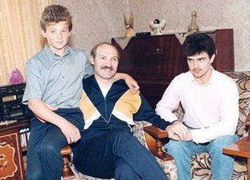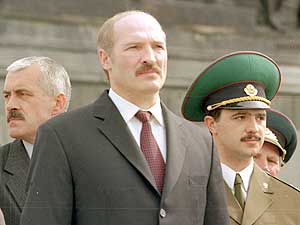EU-Belarus Relations: Playing Hardball

EU travel ban against 21 Belarusian officials provoked extravagant behaviour by Belarusian authorities which analysts are still struggling to explain. On 28 February Belarus asked the Polish and EU delegation ambassadors to leave the country. The EU response was strong and equally unexpected: it recalled all its ambassadors from Minsk in a sign of solidarity.
This confrontation wasted another opportunity to restart the EU-Belarus engagement dialogue. It may also negatively affect the human rights situation in the country. Experts propose a variety of explanations of this conflict, from psychological reasons to the plot of Russians. But regardless of the explanation, the relations between the European Union and Belarus are now at the lowest point ever, which harms all parties involved.
Unexpected Scandal
Many expected improvement in EU-Belarus relations when Gunnar Wiegand from the European External Action Service was officially visiting Minsk on 8-10 February. After a series of meetings with Belarusian officials Wiegand announced that several political prisoners might be released in the following weeks. It looked like the success of tacit diplomacy.
However, something else happened. The court in the eastern of Belarusian city Vitsebsk sentenced a prominent opposition activist Siarhei Kavalenka to 25 months in prison. His only "crime" was hanging out an old national flag on the New Year tree at the central square of Vitebsk. This unexpectedly harsh sentence was one of the reasons why EU Foreign Ministers’ decided to extend travel ban to 21 more representatives of Belarusian authorities.
But despite intensive lobbying of some opposition groups, the EU stopped short of introducing new economic sanctions either against Belarusian state enterprises or businessmen. It seemed like one compromise too many. No one expected that in response the Belarusian Foreign Ministry would demand the Polish and EU delegation ambassadors to leave the country to demonstrate their disagreement with the EU Council’s decision. Subsequently Belarus recalled its ambassadors from Brussels and Warsaw “for consultations”. The EU countries responded to that action by a unified recall of all their ambassadors from the Belarusian capital.
Belarus: "Do Not Try to Teach Us!"
A sudden departure of European ambassadors shocked Belarusian experts. One of the leaders of the Tell the Truth campaign Andrey Dmitriev thinks that Lukashenka wanted to show its firmness in hard economic times. A former member of parliament, Volha Abramava, supposed that this conflict was necessary for consolidation of the Belarusian people around the ruling elite before the 2012 parliamentary election.
According to BISS analysts Dzianis Melyantsou and Alexey Pikulik, the main problem is that the European Union sees Belarus as a typical Eastern European country that aspires to the EU membership. But Belarusian authorities would prefer to be treated like Kazakhstan or Azerbaijan. In other words, they do not want to have conditions set on their dialogue on political issues. Belarusian authorities try to undermine the EU’s belief that it is possible to change the regime in Belarus.
One of the leaders of the Belarusian opposition Anatol Liabedzka thinks that Europe's failure either to introduce economic sanctions or to significantly increase the travel ban list was seen as a weakness by Lukashenka and he tried to play a hardball in return. The European Union responded in the same manner.
The Russian Factor
Other experts are quick to remind that Vladimir Putin conducted his election campaign using anti-Western rhetoric. It is possible that Lukashenka wanted to display his loyalty to Putin to extract concessions later. Uladzimir Matskevich and some other experts believe that the only party which benefits from further isolation of Belarus is the Russian Federation.
Given the influence of the Russian security services on their Belarusian colleagues this version has its own merits. Russian tycoons and state officials may renew pressure on Belarus over privatisation of key assets after Putin's victory and Belarus isolation would help them secure better deals.
Lithuanian President Dalia Grybauskaite also thinks that the isolation of the official Minsk will only increase Russia's influence in the country. "Politically and economically, they just push Belarus to Russia and reduce its dependence on the West or any influence of the West," she said.
Harmful Consequences, No Winners?
The Belarusian issue consolidated European politicians and became a matter of principle for them. It is again high on the EU agenda. This may lead to new European projects aimed at changing the situation in Belarus. Moreover, the diplomatic scandal provided advocates of economic sanctions with new arguments and raised doubt about the future of the 2014 IIHF World Hockey Championship in Belarus.
It is hardly possible that both sides are ready for further confrontation. Many fear that economic sanctions are disadvantageous and will increase the dependence of Belarus from Russia. And nobody is interested in deterioration of the human rights situation in Belarus in case of new unfriendly acts.
Belarusian authorities have already made clear that they could increase pressure on civil society. In particular, they threatened to initiate criminal prosecution against several opposition activists who advocated EU sanctions against Belarus. As in the past activists inside Belarus serve as hostages of Lukashenka's geopolitical games.
When Will the Ambassadors Return?
The European Union and Belarus are interested in dialogue, but none wants to make the first step. Both sides intend to maximise their opportunities and minimise their contributions. Belarus is not ready to break off trade or diplomatic relations with European countries with which it has more than $7.5bn trade surplus.
And Gunnar Wiegand’s visit shows that negotiations continue using semi-formal diplomatic channels even in the conflict situation. Andrei Savinykh from the Belarusian Foreign Ministry declared that they were not planning to recall ambassadors from other EU countries and said that EU representatives could come back when they would like to do that.
The European Union is the only serious international actor that is truly interested in an independent, democratic and prosperous Belarus. Although the EU could do much more even now, in the long-run it is the only actor able and willing to provide resources for the transformation of the country towards a successful market economy. Clearly, safe and democratic neighbourhood is in their interest.
Engagement is also in the interests of Belarusian authorities. Lukashenka may soon face increased economic pressure from Russia. Once Vladimir Putin is done with his reelection campaign he may become less interested to pump as many subsidies into the Belarusian economy and may request something more tangible in return.




 Is Viktar demonised? The Charter 97 web site believes that he was engaged in a crackdown on protests after the last presidential elections. Opposition activist Uladzimir Baradach has said that Viktar's "personal team" might be behind the terrorist attack in the Minsk subway. But again there are no facts to back up these claims.
Is Viktar demonised? The Charter 97 web site believes that he was engaged in a crackdown on protests after the last presidential elections. Opposition activist Uladzimir Baradach has said that Viktar's "personal team" might be behind the terrorist attack in the Minsk subway. But again there are no facts to back up these claims.
